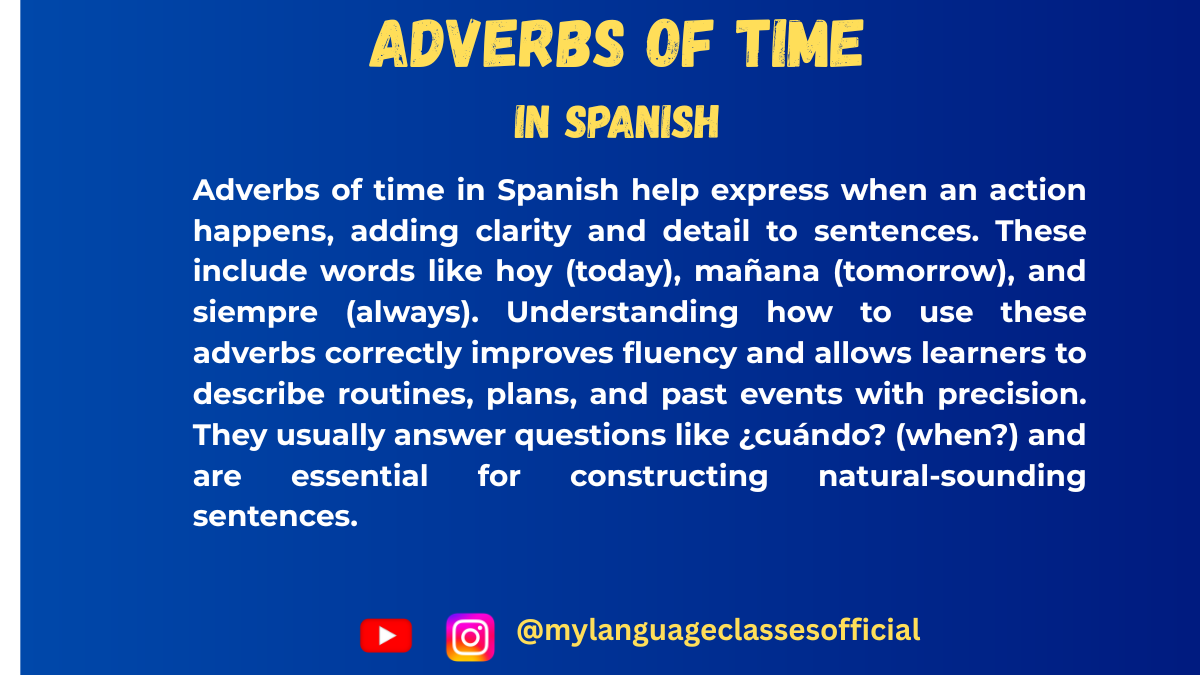Your cart is currently empty!
Tag: Spanish adverbs of time with examples
-

Adverbs of Time in Spanish
Adverbs of time (“los adverbios de tiempo”) are essential in Spanish to indicate when an action takes place. They help provide clarity and context to sentences, making conversations more precise. In this article, we will explore common Spanish adverbs of time, their meanings, examples, and grammatical considerations.
What Are Adverbs of Time?
Adverbs of time modify verbs, adjectives, or other adverbs by indicating the timing of an action. They answer questions like ¿Cuándo? (When?) and ¿Cada cuánto tiempo? (How often?).
Common Spanish Adverbs of Time
Here is a list of frequently used adverbs of time in Spanish along with their meanings and example sentences:
1. Adverbs for Specific Points in Time
- Hoy (Today)
- Hoy es un día especial. (Today is a special day.)
- Mañana (Tomorrow)
- Mañana voy al médico. (Tomorrow I am going to the doctor.)
- Ayer (Yesterday)
- Ayer llovió mucho. (Yesterday it rained a lot.)
- Ahora (Now)
- Ahora estoy ocupado. (Now I am busy.)
- Luego (Later)
- Voy al cine, luego te llamo. (I am going to the cinema, later I will call you.)
- Antes (Before)
- Antes de salir, apaga la luz. (Before leaving, turn off the light.)
- Después (After)
- Después de cenar, salimos a caminar. (After dinner, we go for a walk.)
2. Adverbs for Frequency
- Siempre (Always)
- Siempre me levanto temprano. (I always wake up early.)
- Nunca / Jamás (Never)
- Nunca fumo. (I never smoke.)
- Jamás lo volveré a hacer. (I will never do it again.)
- A menudo (Often)
- Voy al gimnasio a menudo. (I go to the gym often.)
- De vez en cuando (From time to time)
- De vez en cuando voy al teatro. (From time to time, I go to the theater.)
- Raramente (Rarely)
- Raramente veo televisión. (I rarely watch TV.)
- Casi nunca (Almost never)
- Casi nunca como comida rápida. (I almost never eat fast food.)
3. Adverbs for Duration
- Todavía / Aún (Still, yet)
- Todavía no he terminado. (I have not finished yet.)
- Ya (Already)
- Ya terminé la tarea. (I already finished the homework.)
- Por fin / Finalmente (Finally)
- Finalmente llegó el paquete. (The package finally arrived.)
- Desde entonces (Since then)
- Desde entonces no hemos hablado. (Since then, we have not spoken.)
- Mientras (While)
- Escucho música mientras estudio. (I listen to music while I study.)
Grammar and Usage Considerations
1. Placement in a Sentence
- In most cases, adverbs of time appear at the beginning or the end of a sentence:
- Hoy tengo clases. (Today I have classes.)
- Tengo clases hoy. (I have classes today.)
- Some adverbs, like ya, are placed before the verb:
- Ya terminé mi trabajo. (I already finished my work.)
2. Agreement and Gender Considerations
- Unlike adjectives, adverbs do not change in gender or number.
- However, some time expressions require articles or prepositions, such as:
- El lunes pasado (Last Monday) vs. Los lunes (On Mondays)
- En la mañana (In the morning) vs. Por la mañana (During the morning)
Forming Adverbs of Time from Adjectives
1. Regular Formation (Adding -mente)
Many adverbs are formed by adding -mente to the feminine singular form of adjectives:
- Rápido (Fast) → Rápidamente (Quickly)
- Frecuente (Frequent) → Frecuentemente (Frequently)
2. Irregular Formation
Some adverbs do not follow the regular -mente rule and must be memorized:
- Bien (Well), Mal (Badly), Tarde (Late), Temprano (Early)
- Example: Él llegó tarde a la reunión. (He arrived late to the meeting.)
3. Using Prepositional Phrases as Adverbs of Time
Some expressions function as adverbs when combined with prepositions:
- De vez en cuando (From time to time)
- Cada día (Every day)
- Hace un rato (A while ago)
Common Mistakes to Avoid
- Confusing “ya” and “todavía”:
- Ya means “already”: Ya hice mi tarea. (I already did my homework.)
- Todavía means “still”: Todavía estoy haciendo mi tarea. (I am still doing my homework.)
- Misplacing “nunca” in negative sentences:
- Correct: Nunca he estado en España. (I have never been to Spain.)
- Incorrect: No he estado nunca en España. (Although this is sometimes used in spoken Spanish, it’s not grammatically preferred.)
Conclusion
Adverbs of time are fundamental for constructing clear and accurate sentences in Spanish. Understanding their placement, variations, and common expressions will enhance your fluency. By practicing these adverbs in different contexts, you will develop a more natural and precise way of speaking Spanish.
If you enjoyed this lesson, be sure to check out more posts like this on my blog at My Language Classes. Don’t forget to subscribe my YouTube channel and follow me on Instagram for the latest language learning tips and lessons. Leave a comment below to share your thoughts, or ask any questions you have.
Happy learning! 😊
📚 Continue Learning Spanish
Share this:
- Click to share on Facebook (Opens in new window) Facebook
- Click to share on X (Opens in new window) X
- More
- Click to email a link to a friend (Opens in new window) Email
- Click to share on LinkedIn (Opens in new window) LinkedIn
- Click to share on Reddit (Opens in new window) Reddit
- Click to share on Tumblr (Opens in new window) Tumblr
- Click to share on Pinterest (Opens in new window) Pinterest
- Click to share on Pocket (Opens in new window) Pocket
- Click to share on Telegram (Opens in new window) Telegram
- Click to share on Threads (Opens in new window) Threads
- Click to share on WhatsApp (Opens in new window) WhatsApp
- Click to share on Mastodon (Opens in new window) Mastodon
- Click to share on Nextdoor (Opens in new window) Nextdoor
- Click to share on Bluesky (Opens in new window) Bluesky
- Hoy (Today)
